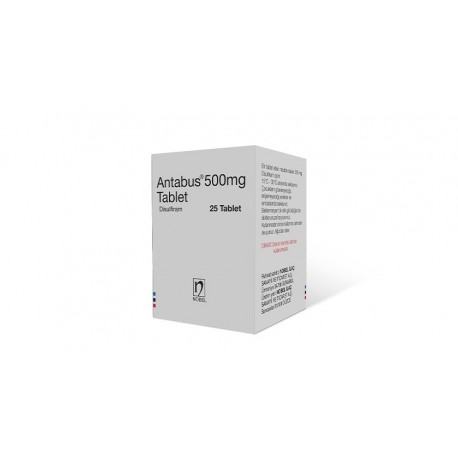 View larger
View larger Antabuse (Disulfiram) 500 Mg 25 Tablets
ANTB3370
New product
BUY MORE PAY LESS
| Quantity | Discount | |
|---|---|---|
| 2 | 5% | |
| 3 | 10% | |
| 4 | 15% | |
| 5 | 20% |
Volume discounts
| Quantity | Discount | You Save |
|---|---|---|
| 2 | 5% | Up to $2.90 |
| 3 | 10% | Up to $8.70 |
| 4 | 15% | Up to $17.40 |
| 5 | 20% | Up to $29.00 |
More info
ANTABUSE 500 mg tablet Taken by mouth.
Active ingredient
Each tablet contains 500 mg of disulfiram.
Excipients
Contains PVP K30 (Kollidon 30), Corn starch, Microcrystalline cellulose pH 102, Talc, Magnesium stearate.
3.How to use ANTABUSE
Always take ANTABUSE as instructed by your doctor. If you are unsure, ask your doctor or pharmacist. It is recommended that you go through a general check before starting ANTABUSE in order to find out whether you are suitable for treatment.
ANTABUS treatment is usually started in a hospital or a private clinic. It is important that you do not drink alcohol for at least 24 hours before taking the first dose.
In adult and elderly patients, treatment is started by taking a maximum of 1 tablet (500 mg) every morning every morning for 1-2 weeks, then the dose is reduced to 250 mg per day. If drowsiness occurs,
This document has been electronically signed in accordance with the Electronic Signature Law No. 5070. The document can be checked at https://ebs.titcKgov.tr/Basvuru/EImza/Kontrol. The secure electronic signature is the same as the original. Document verification code: 1 YnUyaklUYn uyS3kOQ3NRQ3NRQ3NR
the dose can also be taken in the evening. The maintenance daily dose may vary in the range of 125-500 mg, but should not exceed 500 mg. Unless your doctor tells you otherwise, do not use it for more than 6 months.
Application route and method
ANTABUSE is for oral use only.
Swallow the tablets with water.
Different age groups
Use in children
Use in the elderly
Use in the elderly:
There is no information about the use of ANTABUSE in the elderly.
Special use cases
Kidney / liver failure:
It should be used with caution in patients with kidney and liver failure.
If you have an impression that the effect of ANTABUSE is too strong or too weak, talk to your doctor or pharmacist.
If you use more ANTABUSE than you should
If you (or someone else) have swallowed more than one tablet at the same time, or if you think a child may have swallowed, contact the nearest hospital's emergency department or tell your doctor immediately. Overdose; It includes signs of nausea or vomiting, stomach pain, diarrhea, drowsiness, mental illness, fatigue, rapid heartbeat, high body temperature, low blood pressure, loss of muscle control, increased blood sugar, changes in blood (seen in blood tests). Serious conditions can result in coma, seizures, or death.
4. What are the possible side effects?
Like all medicines, there may be side effects in people who are sensitive to the substances contained in ANTABUSE
Very common: more than 1 in 10 people
Common: Less than 1 in 10 people, more than 1 in 100 people
This document has been electronically signed in accordance with the Electronic Signature Law No. 5070. The document can be checked at https://ebs.titck.gov.tr/Basvuru/EImza/Kontrol. The secure electronic signature is the same as the original. Document verification code: 1 YnUyaklUYn uyS3kOQ3NRQ3NRQ3NR
Less than 1 in 100 people, more than 1 in 1,000 people
Uncommon: Rare:
Very rare: Not known:
Less than 1 in 1,000 people, more than 1 in 10,000 people
Less than 1 in 10,000 people (including single cases reported) cannot be estimated from the available data.
Common:
Drowsiness
• Headache
Bad breath
Metallic taste in the mouth
Epigastralgia (stomach pain)
• Diarrhea
• Mania (epileptic seizures)
Depression
Unusual:
• Decrease in sexual functions
Allergic reactions with acne-like rash, itching and / or rash
Rare:
A type of psychiatric illness similar to schizophrenia
Eosinophilia (a type of blood cell having a higher than normal number)
Damage to liver cells
• Damage / inflammation in distal (peripheral) nerves (causes pain and loss of sensation in hands and feet)
• Inflammation of the visual nerves Not known:
Encephalopathy (brain disease)
2.Things to watch out for before using ANTABUSE
DO NOT USE ANTABUSE in the following situations
USE ANTABUSE CAREFULLY in the following situations
If;
If you have kidney, liver or lung disease,
• If you have diabetes,
If you have low blood pressure,
If you have a brain injury,
• You have epilepsy (epilepsy).
Please consult your doctor if these warnings apply to you, even at any time in the past.
Using ANTABUSE with food and drink
Some foods, liquid medicines, tonics, cosmetics, perfumes and sprays may contain enough alcohol to cause a disulfiram-alcohol reaction. Also, caution should be exercised regarding low alcohol and non-alcoholic beers and wines that can cause undesirable effects when consumed in sufficient quantities.
Use of ANTABUSE with alcohol
A disulfiram-alcohol reaction may occur if you drink alcohol or consume other alcohol-containing foods or beverages while using ANTABUSE or within 2 weeks of stopping treatment. This reaction can be unpredictable and its symptoms can be serious and life-threatening.

